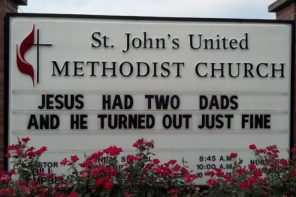Over the weekend I participated in a fascinating conference/conversation headed by Professors Philip Clayton and Marjorie Hewitt Suchocki of Claremont School of Theology. Under the banner of “Rekindling Theological Reflection: Transformative Thought for Progressive Action” thirty theologians and Christian ethicists were brought together to brainstorm concerning how our chosen vocations might better impact our world.
The guest list was amazing (as well as intimidating for this young scholar). Witnessing such prominent scholars and productive thinkers as Harvey Cox, Emilie Townes, Gary Dorrien and Ellen Armour offer historical antecedents and contemporary insights about the creation of a more just church and society was worth the price of the ticket.
Yet two of the more interesting interventions came from Jack Fitzmier, Executive Director of the American Academy of Religion, and Tony Jones, an independent author, blogger and emerging church entrepreneur. Fitzmier challenged our very raison d’etre as academic theologians. In an era marked by faltering seminaries and divinity schools, limited graduate programs in the field and even fewer career options for doctoral candidates, academic theologians must rethink their role and task. Too many are fussing over Karl Barth and directing inconsequential dissertations on Bonhoeffer while the very system which affords us a role in society is on fire! Then we wonder why it is, Fitzmier opined, that the academic theologian has become an alienated figure from the church at best, and an antiquated relic of a dying institution at worst.
Similarly, Tony Jones charged that progressive theologians have problems with perspective and public relations. He appeared to suggest that traditional academics major in the meta-minors (such as questions of inclusion and power relations) while shirking concentrated action on the ground. And, in turn, progressive theologians fail to develop a coherent message that will translate in a world determined by mass media. In essence, if we are going to transform the church and society we have to get busy streamlining our message and our marketing/entrepreneurial appeal.
Both of their suggestions make sense to me (except for the latter’s possibly unintended, though still unfortunate, swipe at inclusion). In examining the message and mores of numerically successful Christian organizations of the contemporary moment it does appear that academic theologians rarely come across as a constitutive influence. Prominent groups are more often informed by media personalities such as the late Jerry Falwell and Peggy Noonan on the right or Jim Wallis and E.J. Dionne on the left. This is why I can appreciate Jack Fitzmier’s attempt at encouraging academic theologians to enter public debate via multiple venues. We cannot and should not be an academic island unto ourselves. We should be writing more accessible books, creating documentaries, blogging, and appearing on daily talk shows and equivalent outlets.
But at the risk of sounding too much like I have bought-in to the whole ivory-tower enterprise, I remain skeptical of any attempt to create a new “credentialed” cohort of media talking heads. In our efforts to raise our profile and public involvement, academics must remain cognizant of the intoxicating allure of media attention and professional punditry. A 24 hour infotainment news cycle is often too willing to replace thorough social analysis with 5 second sound-bites, cute catchphrases and provocative quotes. And in this particular historical moment, as the problems and pains resultant of the dominant worldview of recent decades engulfs us, society can ill-aford media sound-bite driven solutions to complex problems.
Several scholars such as Paul Capetz of United Theological Seminary, Twin Cities and Mayra Rivera of Pacific School of Religion sought to keep us honest here. In the name of being relevant, they argued, we cannot become a part of the cult of anti-intellectualism that only exacerbates the problem. Nor, as Rich Amesbury of Claremont School of Theology argued, should we allow our intellectual production to become colonized by the language of the economy and marketing.
This is why any talk about rekindling theological imagination must distinguish the difference between being popular and making an impact. Let’s not forget that the progressive, prophetic tradition has always made an impact yet has never been popular. Prophets work from the margins. And their voice, when at its best, is rejected by the mainstream. This is why progressive theologians should not be pulled into a popularity contest. Nor should we strive to create a reality show, “America’s Next Top Theologian.” But we must keep our vocation ever before us; which may or may not involve tenure and institutional resources. Laurel Schneider from Chicago Theological reminded us that progressive theologians are called to speak the truth, grace and compassion of the gospel to systems of power that impinge upon the poor, the weak, the defenseless and the marginalized.
And as long as there are systems of power and oppression across this globe, progressive theologians will always have a credible and critical role to play in both the church and society.



